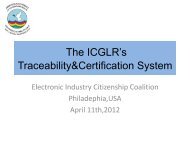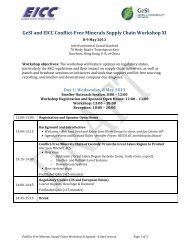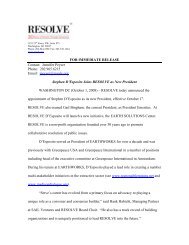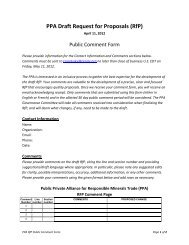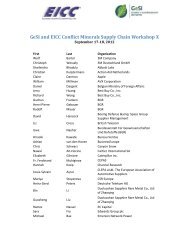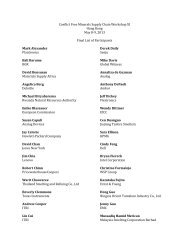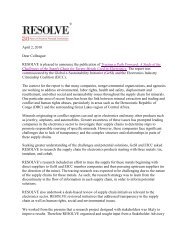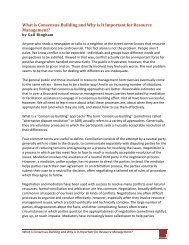Toward SuSTainabiliTy: The roleS and limiTaTionS of ... - Resolve
Toward SuSTainabiliTy: The roleS and limiTaTionS of ... - Resolve
Toward SuSTainabiliTy: The roleS and limiTaTionS of ... - Resolve
You also want an ePaper? Increase the reach of your titles
YUMPU automatically turns print PDFs into web optimized ePapers that Google loves.
Chapter 2: Actors – Government 32that importers show they are not importingillegally harvested wood. Certification schemesthat encompass chain-<strong>of</strong>-custody requirementsto verify the source <strong>of</strong> imported products haveemerged as an effective way to demonstrate thisdue diligence (Cashore & Stone, 2012).Antitrust LawsAs discussed in Chapter 1, “roundtables” thatbring industry competitors, NGOs, <strong>and</strong> otherstogether to seek agreement on environmental<strong>and</strong> social issues have been an increasinglycommon route for developing st<strong>and</strong>ards <strong>and</strong>, insome cases, certification systems. Roundtablesare <strong>of</strong>ten described as “precompetitive” discussions,based on the idea that the sustainability (orunsustainability) <strong>of</strong> raw material production <strong>and</strong>supply affects all businesses in a sector. To minimizeconcerns about anti-competitive behavior,roundtables have established antitrust policiesthat explicitly state the topics that can <strong>and</strong> cannotbe discussed, <strong>and</strong> these policies are intended toensure compliance with national antitrust laws(Roundtable on the Application <strong>of</strong> Antitrust Lawto State-Owned Enterprises, 2009).International Trade AgreementsIntergovernmental free-trade agreements caninject legal uncertainty into the internationalarena. Carey <strong>and</strong> Guttenstein (2008) observethat, despite analyses indicating that certificationschemes are legal under international tradeagreements, debates continue regarding whethersuch schemes promote protectionist interestsor allow nations to impose their own policieson other nations. Bernstein <strong>and</strong> Hannah (2008)argue that the more widespread the supportfor certification becomes, the more likely it isto conflict with the international trade regime.For example, the European Union <strong>and</strong> othergovernments <strong>and</strong> intergovernmental agenciesincreasingly are developing sustainable procurementpolicies that can promote certification.Yet some governments <strong>and</strong> commentators viewthese st<strong>and</strong>ards as a veiled way to discriminateagainst developing countries’ products. As longas certification is voluntary, or is limited to nichemarkets, it is less likely to be subject to tradedisputes. But as governments increasingly recognize,favor, or require it, exporting countries aremore likely to claim that certification is m<strong>and</strong>atoryin practice <strong>and</strong> is therefore a de facto barrier totrade (Bernstein & Hannah, 2008).Voluntary st<strong>and</strong>ards considered to be m<strong>and</strong>atoryin practice have been the subject <strong>of</strong> severaltrade disputes under WTO law already. In thesecases, the determination <strong>of</strong> whether a st<strong>and</strong>ard ormeasure was de facto m<strong>and</strong>atory depended uponwhether it had the effect <strong>of</strong> being legally binding<strong>and</strong> whether there was a trade consequencefor failing to adhere to it. <strong>The</strong>se concerns onlyapply to a st<strong>and</strong>ard adopted <strong>and</strong> implementedby a WTO member government; those operatedindependently <strong>of</strong> governments are less vulnerableto trade challenges (Bernstein & Hannah, 2008).Government as PolicyMaker <strong>and</strong> EnforcerRegulatory PoliciesGovernments can stimulate certification indirectly,most obviously by failing to regulateenvironmental or social practices <strong>and</strong> therebycreating incentives for the emergence <strong>of</strong> privatecertification schemes. Some believe that such afailure to regulate stimulated the creation <strong>of</strong> theFSC, the MSC, <strong>and</strong> others (Cashore, et al., 2004).Conversely, the threat <strong>of</strong> government regulationin the absence <strong>of</strong> certification might also spurthe development <strong>of</strong> private schemes (Meidinger,2006). If a critical mass <strong>of</strong> industry players participatesin a certification scheme (or creates theillusion <strong>of</strong> participating), political pressure forgovernment regulation might be alleviated, <strong>and</strong>regulation avoided. <strong>The</strong> risk for governmentsin these cases is that industry might establishst<strong>and</strong>ards that are perhaps better than existingconditions but not as high as what the governmentor others would prefer. Moreover, sincecertification is voluntary, a subset <strong>of</strong> industryplayers—potentially the worst players with themost significant environmental impacts—maynot participate. An alternative for governmentsmight be to provide companies taking part incertification schemes with favorable treatment<strong>Toward</strong> Sustainability: <strong>The</strong> Roles <strong>and</strong> Limitations <strong>of</strong> Certification



